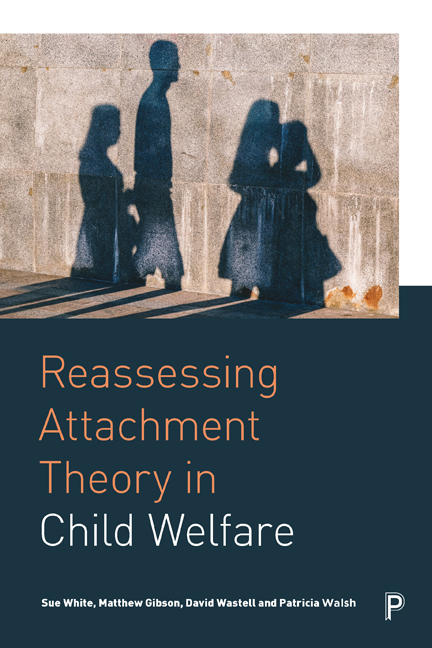Book contents
- Frontmatter
- Contents
- List of Figures, Table and box
- About the Authors
- Acknowledgements
- Preface: Becoming Attached to Attachment Theory
- 1 Love is a Wondrous State: Origins and Early Debates
- 2 Social work and the Attachment Story: a Felicitous Bond?
- 3 Shaping Practice: Prescribing Assessment
- 4 Practising Attachment Theory in Child Welfare
- 5 Exhibiting Disorganised Attachment: not even Wrong?
- 6 Breaking the back of love: Attachment Goes Neuro-Molecular
- Coda: love Reawakened?
- References
- Index
3 - Shaping Practice: Prescribing Assessment
Published online by Cambridge University Press: 23 February 2021
- Frontmatter
- Contents
- List of Figures, Table and box
- About the Authors
- Acknowledgements
- Preface: Becoming Attached to Attachment Theory
- 1 Love is a Wondrous State: Origins and Early Debates
- 2 Social work and the Attachment Story: a Felicitous Bond?
- 3 Shaping Practice: Prescribing Assessment
- 4 Practising Attachment Theory in Child Welfare
- 5 Exhibiting Disorganised Attachment: not even Wrong?
- 6 Breaking the back of love: Attachment Goes Neuro-Molecular
- Coda: love Reawakened?
- References
- Index
Summary
Behind every adult vice lies a mother lacking in virtue, a mother who was unwilling or unable to devote all her love and attention to her infant. Moreover, in the wider society, this view influences personal decisions, social expectations, and public policies about custody cases, adoptions, orphanages, and child care in general. (Vicedo, 2013, p 2)
Changes within the field of politics from the 1970s onwards began to re-evaluate the professions within the public sector (Power, 1997; Munro, 2004). Economic ideas about the need for efficiency, effectiveness and value for money in public services achieved dominance within government thinking and, consequently, social work practice came under increasing scrutiny and regulation (Mayer and Timms, 1970; Fischer, 1976; Brewer and Lait, 1980; Parton, 1991; Humphries, 1997; Munro, 2004; Featherstone et al, 2014, 2018a). At the heart of these changes was a belief that the government needed greater control over what social workers, and indeed all public sector employees, did (Power, 1997; Munro, 2004). Rather than social workers performing therapeutic work or engaging in political activity, as was the case into the 1960s and 1970s, a view was formed in government that social workers needed to focus on individual cases, identify the needs of families, refer to other services to meet those needs, or take decisive action to prevent harm (Parton, 1996). In refashioning the role of social workers, the increasing social acceptance of attachment theory, and its concomitant discourse, influenced and guided the UK government's attempt to define and restructure what social work practice was. There is some irony that, read differently, attachment theory has the potential to provide a powerful antidote to such managerialism.
The attachment story in use offered explanations for how children become harmed by insensitive, unresponsive and inconsistent parenting. Such ideas fed into the government's agenda for social work practice: namely to assess (needs) and refer (to services) or remove (to prevent harm) (Parton, 1996). Social workers were, therefore, directed to assess parents’ capacity to meet the needs of their children from the perspective of attachment theory. For example, in 1988, the UK Department of Health produced Protecting children: A guide for social workers undertaking a comprehensive assessment, known at the time as the ‘Orange Book’.
- Type
- Chapter
- Information
- Reassessing Attachment Theory in Child Welfare , pp. 45 - 62Publisher: Bristol University PressPrint publication year: 2019



